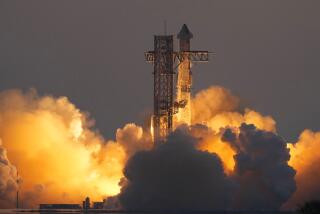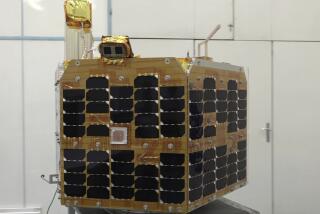Russian rocket carrying Mexican satellite crashes in Siberia after liftoff
- Share via
Reporting from Moscow — A Russian Proton-M rocket malfunctioned shortly after it blasted off early Saturday from its launchpad in Kazakhstan, crashing in Siberia along with the Mexican satellite it was intended to put into orbit.
It was the second Russian space mission failure in less than a month, following an April 28 mishap involving an unmanned cargo craft ferrying supplies to the International Space Station.
“An emergency situation in the third-stage engine occurred during a Proton-M launch into orbit,” Roscosmos, Russia’s federal space agency, said via Twitter in announcing the latest problem with the workhorse rocket.
Saturday’s accident occurred about nine minutes after liftoff, when the third stage failed to separate and deploy the MexSat-1 communications satellite, Roscosmos reported.
“The Mexican satellite is lost. Launches of rockets of the Proton type will be grounded until the reason is identified,” an unnamed Roscosmos source was quoted as telling Russia’s state-run Sputnik news agency.
The next Proton-M mission was to have taken a British satellite into orbit in June.
Roscosmos officials told Sputnik that the telemetry of the rocket was lost about a minute before the third stage was supposed to have detached and sent the satellite into orbit.
The 5.4-ton MexSat-1 was built for the Mexican government by Boeing Satellite Systems and had been expected to be in service for 15 years. Roscosmos said the satellite and the rest of the rocket likely burned up as they plummeted to Earth from an altitude of 100 miles.
Sputnik quoted local officials in the Zabaikalsk area of Siberia, near the Mongolian and Chinese borders, as saying there had been no reports of the space debris landing in populated areas. Officials were concerned, however, about the tons of unspent toxic fuel the rocket was carrying when the accident occurred, Sputnik said.
The April 28 incident occurred when the Soyuz rocket propelling the Progress cargo craft suffered a fuel leak into its third stage, disrupting the supply spaceship’s ability to adjust its orbit to the International Space Station, Roscosmos chief Igor Komarov said. The cargo vessel, with three tons of supplies on board, fell into a lower orbit and eventually dropped into the atmosphere and burned up over the Pacific Ocean on May 8.
The Soyuz-Progress failure prompted Roscosmos to delay by a month the return to Earth of three of the space station’s six-person crew, which had been set for early May. Their replacements will also arrive to the station later than scheduled, probably not until July, the space agency said.
Saturday’s Proton-M failure was reportedly identical to one exactly a year earlier in which a Russian Express-AM44 satellite was lost. It was at least the fourth satellite-launching mission failure since 2011.
Follow @cjwilliamslat for the latest international news 24/7
More to Read
Sign up for Essential California
The most important California stories and recommendations in your inbox every morning.
You may occasionally receive promotional content from the Los Angeles Times.











